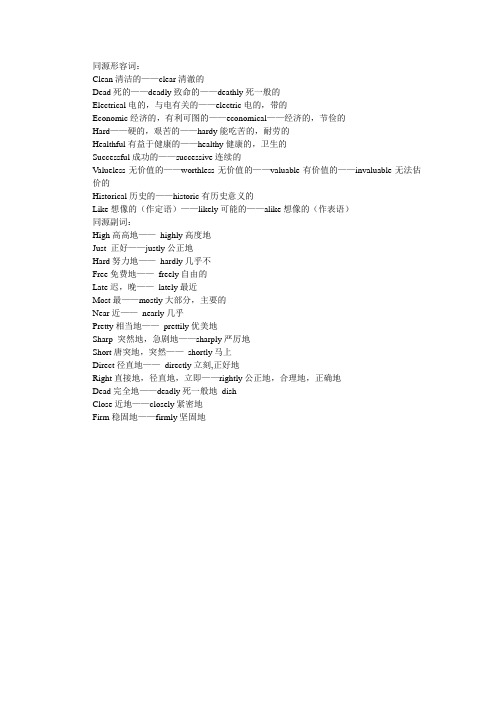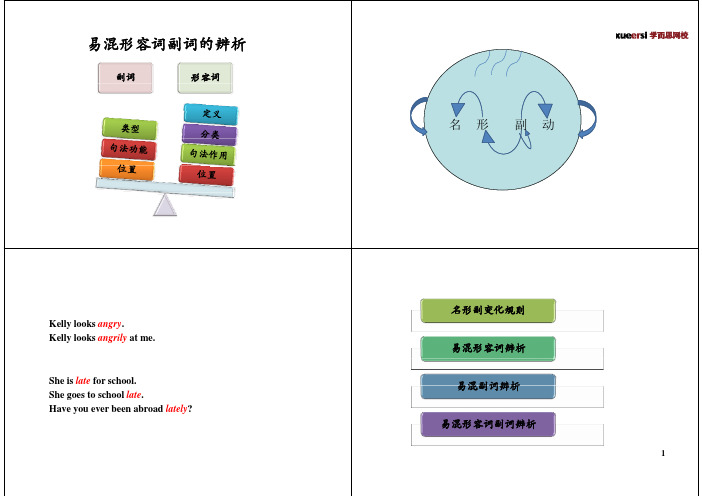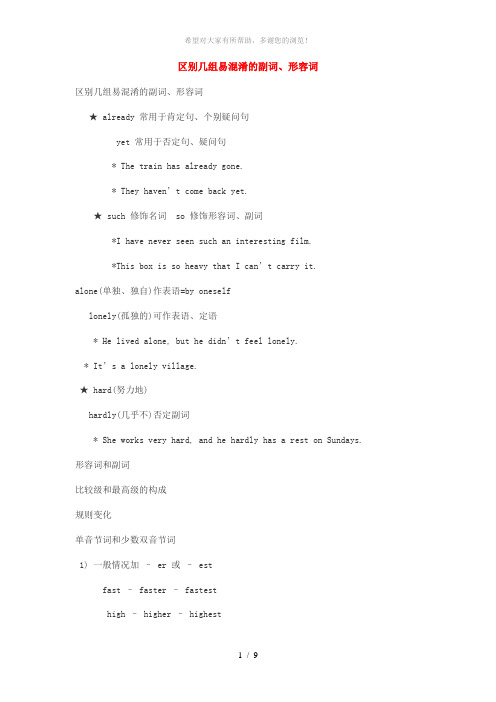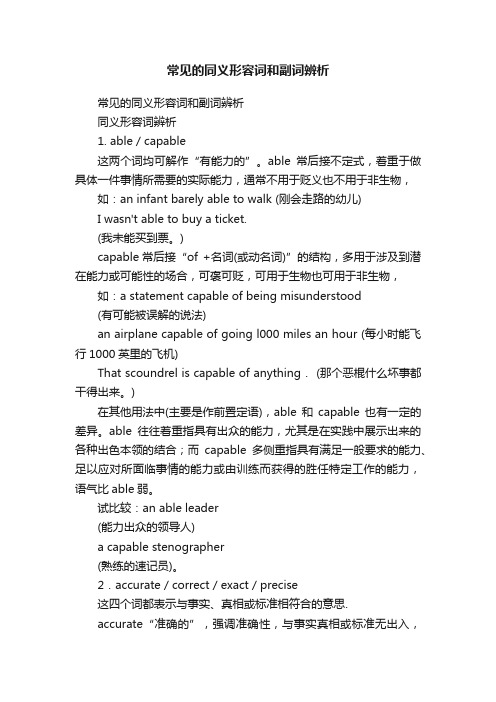同源形容词与副词的区别容易混淆拼错的词
易混淆的同源形容词和副词

同源形容词:
Clean清洁的——clear清澈的
Dead死的——deadly致命的——deathly死一般的
Electrical电的,与电有关的——electric电的,带的
Economic经济的,有利可图的——economical——经济的,节俭的
Hard——硬的,艰苦的——hardy能吃苦的,耐劳的
Healthful有益于健康的——healthy健康的,卫生的
Successful成功的——successive连续的
Valueless无价值的——worthless无价值的——valuable有价值的——invaluable无法估价的
Historical历史的——historic有历史意义的
Like想像的(作定语)——likely可能的——alike想像的(作表语)
同源副词:
High高高地——highly高度地
Just 正好——justly公正地
Hard努力地——hardly几乎不
Free免费地——freely自由的
Late迟,晚——lately最近
Most最——mostly大部分,主要的
Near近——nearly几乎
Pretty相当地——prettily优美地
Sharp 突然地,急剧地——sharply严厉地
Short唐突地,突然——shortly马上
Direct径直地——directly立刻,正好地
Right直接地,径直地,立即——rightly公正地,合理地,正确地
Dead完全地——deadly死一般地dish
Close近地——closely紧密地
Firm稳固地——firmly坚固地。
修改方法如何纠正形容词和副词用法混淆的句子

修改方法如何纠正形容词和副词用法混淆的句子在写作中,正确使用形容词和副词是非常重要的。
有时候,我们会错误地混淆这两者的用法,导致句子表达不够准确或者易于误解。
本文将介绍一些修改方法,帮助纠正形容词和副词用法混淆的句子。
一、了解形容词和副词的区别首先,我们需要了解形容词和副词的基本区别。
形容词用于修饰名词,描述人或物的性质、特征或状态,例如"beautiful"(美丽的)、"happy"(快乐的)。
副词则用于修饰动词、形容词或其他副词,描述行为的方式、程度或频率,例如"quickly"(快速地)、"very"(非常)。
二、分析句子结构和语境在修改句子时,我们需要仔细分析句子结构和语境,判断形容词或副词应该放在何处。
一般来说,形容词紧靠名词使用,而副词大多放在动词之后或者修饰整个句子。
三、使用适当的形容词1. 如果你想描述名词的性质、特征或状态,应该使用形容词。
例如:- 错误句子:"He ran quick to catch the bus."- 正确句子:"He ran quickly to catch the bus."2. 如果你想描述动词的方式、程度或频率,应该使用副词。
例如:- 错误句子:"She did the test perfect."- 正确句子:"She did the test perfectly."四、修正用法混淆的句子有时候,我们可能会产生形容词和副词的混淆,下面是一些常见的错误用法及其修正:1. 形容词修饰副词- 错误句子:"He drives very good."- 正确句子:"He drives very well."2. 副词修饰名词- 错误句子:"She is an extremely pretty."- 正确句子:"She is extremely pretty."3. 形容词修饰动词- 错误句子:"He loudly screamed at her."- 正确句子:"He screamed loudly at her."4. 副词修饰形容词- 错误句子:"The test was incredibly difficult."- 正确句子:"The test was incredibly difficultly."五、练习和反复审查为了提高技巧和熟练度,我们需要进行练习和不断的反复审查。
易混形容词副词的辨析

1. The bear was caught
.
A. live
Байду номын сангаас
B. lively
C. living D. alive
2. The World Cup in France was the biggest match in the world.
A. alive
B. live
C. lively
D. living
adj. 快的
adj. 快的 adv. (俗语)代
adv. 运动速度快
替quickly
adv. 反应+完成快
adv. 时间上快,
即将发生
Come quick / quickly!
A train is much faster than a bus.
His father will be back to China very soon.
B.alone; lonely
C.lonely; lonely
D.alone; alone
【巩固练习】
1. 她在照顾她生病的父亲。 She is looking after her sick father.
2. The smell makes me sick. 这气味使我感到恶心。
3. He is an ill man. 他是一个邪恶的人。
football
1. 八大 “how”人
How old How many How much How far How long How often How soon How tall
★ +不可数 ★ 价钱
★ 实际长度 ★ 段时间
★ once a day
★ is it..from..to
区别易混淆的副词、形容词

区别几组易混淆的副词、形容词区别几组易混淆的副词、形容词★ already 常用于肯定句、个别疑问句yet 常用于否定句、疑问句* The train has already gone.* They haven’t come back yet.★ such 修饰名词 so 修饰形容词、副词*I have never seen such an interesting film.*This box is so heavy that I can’t carry it.alone(单独、独自)作表语=by oneselflonely(孤独的)可作表语、定语* He lived alone, but he didn’t feel lonely.* It’s a lonely village. ★ hard(努力地)hardly(几乎不)否定副词* She works very hard, and he hardly has a rest on Sundays. 形容词和副词比较级和最高级的构成规则变化单音节词和少数双音节词1) 一般情况加– er 或– estfast – faster – fastesthigh – higher – highestclever – cleverer – cleverest 规则变化单音节词和少数双音节词2) 以字母 e 结尾加–r 或–stfine – finer – finestlate – later – latestnice – nicer – nicest规则变化单音节词和少数双音节词3) 重读闭音节、末尾只有一个辅音字母时双写加–er 或–estfat – fatter – fattestbig – bigger – biggestthin – thinner – thinnest规则变化单音节词和少数双音节词4) 以辅音字母加 y 结尾变 y为 i 加–er 或–estearly – earlier – earliesteasy – easier – easiestlucky – luckier – luckiest规则变化部分双音节和多音节词在词前加 more 或 mostslowly - more slowly - most slowlyeasily - more easily - most easilycarefully - more carefully - most carefully不规则变化good/well – better – bestmany/much – more – mostlittle – less – leastfar – farther – farthest( far – further – furthest )bad/badly/ill – worse – worst形容词和副词比较级和最高级的用法1)表示两者(人或事物)的比较时用比较级,通常用连词 than 引导,表示“较······”或“更······一些”的意思*This cake is more delicious than that one.*Li Lei jumped farther than Jim (did).2) 表示三者或三者以上(人或事物)的比较用最高级,最高级的前面一般要加定冠词the,后面可带of(in,among)短语来说明比较的范围*Shanghai is the biggest city in China.*Lucy sings (the) best of all.*He is the most careful among us.3) 在表示“和······一样······”和“不及······”这类概念时,可以用“as+原级+as”和“not as(so)+原级+as”的句型*Our teacher is as busy as before.*He does not run so (as) fast as I.4) 可用much, still, a little, even, far,three years等表示程度的状语来修饰比较级*She is much taller than Mrs.Liu.*He is three years older than I.*This problem is a little more difficult than the other one.5)几种比较级的使用句型1.“比较级 + and + 比较级”表示“越来越······”*Your English is getting better and better.你的英语越来越好了。
副词与其同源副词的用法比较

副词与其同源副词的用法比较英语中有一些表示方式、程度的副词具有两种形式。
如late,lately;high,highly;slow,showly等等。
在这些词当中,两种不同形式所表达的含义有的完全不同,有的很相似,而有的却完全一致。
这就给人们使用这些词时带来一定的麻烦。
特别是在学生中间,总免不了使用时的混淆。
笔者想就此问题分类作一点探讨。
(一)本类词有hard,hardly;late,lately;most,mostly等等,这两种副词形式含义完全不同,所以,使用时不易引起混淆。
1.He works hard all day.他整天都在使劲地干活。
He hardly works at all.他很少干活。
2.You have come too late.你来得太晚了。
Have you see him lately?你最近见到过他吗?3.The person who talks most is often the one who doesleast.说得最多的人常常干得最少。
The audience consisted mostly of women.观众大部分是女的。
4.The next flight dose not go direct to Tokyo; it goes byway of Shanghai.下趟航班不直飞东京,而是绕道上海。
He will be here directly.他马上就来。
5.The rider pulled his horse up short.骑手突然一下把马勒住。
Make a right turn shortly beyond the village. 村前不远处往右拐。
6.Please stand clear of the gate.请不要站在门前。
He stated his view-point clealy.他很清楚明白地阐述了自己的观点。
7.The exam was pretty difficult.这次考试相当难。
常见的同义形容词和副词辨析

常见的同义形容词和副词辨析常见的同义形容词和副词辨析同义形容词辨析1. able/capable这两个词均可解作“有能力的”。
able常后接不定式,着重于做具体一件事情所需要的实际能力,通常不用于贬义也不用于非生物,如:an infant barely able to walk (刚会走路的幼儿)I wasn't able to buy a ticket.(我未能买到票。
)capable常后接“of +名词(或动名词)”的结构,多用于涉及到潜在能力或可能性的场合,可褒可贬,可用于生物也可用于非生物,如:a statement capable of being misunderstood(有可能被误解的说法)an airplane capable of going l000 miles an hour (每小时能飞行1000英里的飞机)That scoundrel is capable of anything. (那个恶棍什么坏事都干得出来。
)在其他用法中(主要是作前置定语),able和capable也有一定的差异。
able往往着重指具有出众的能力,尤其是在实践中展示出来的各种出色本领的结合;而capable多侧重指具有满足一般要求的能力、足以应对所面临事情的能力或由训练而获得的胜任特定工作的能力,语气比able弱。
试比较:an able leader(能力出众的领导人)a capable stenographer(熟练的速记员)。
2.accurate/correct/exact/precise这四个词都表示与事实、真相或标准相符合的意思.accurate“准确的”,强调准确性,与事实真相或标准无出入,而且这种准确性往往是通过谨慎努力才达到的,如:an accurate picture of social history(对社会历史的准确描述)Clocks in railway stations must be accurate.(火车站的钟必须准确。
高考单词易混知识点总结

高考单词易混知识点总结一、形容词和副词的区别在高考英语中,形容词和副词是常见的易混知识点。
形容词一般修饰名词,用来描述人或事物的特征;而副词则修饰动词、形容词或其他副词,用来描述动作或程度。
例如:1. She is a good student. (形容词修饰名词)2. She sings well. (副词修饰动词)3. The weather is extremely hot. (副词修饰形容词)二、名词单复数的变化在高考英语中,名词的单复数形式也是一个易混知识点。
大多数名词的复数形式在词尾加上-s,但也有一些特殊的变化规则。
例如:1. book – books2. child – children3. tomato – tomatoes三、动词时态的使用动词时态在高考英语中也是一个需要注意的易混知识点。
正确使用动词时态可以使句子的意思更加明确和准确。
例如:1. I have finished my homework. (现在完成时)2. She will go to the party tomorrow. (一般将来时)3. He was studying when I called him. (过去进行时)四、可数名词和不可数名词的区分在高考英语中,可数名词和不可数名词也是一个常见的易混知识点。
可数名词可以用来计数,而不可数名词表示无法分割的整体,不能用数词直接计数。
例如:1. I have three apples. (可数名词)2. I have some milk. (不可数名词)五、固定搭配的正确使用固定搭配在高考英语中也是一个需要注意的易混知识点。
固定搭配是指两个或更多的词固定地搭配在一起,不能随意改变顺序或替换其中的某个词。
例如:1. take place(发生)2. in my opinion(在我看来)3. make a decision(做出决定)六、动词和介词的搭配动词和介词的搭配也是一个需要注意的易混知识点。
形容词和副词的比较等级用法及易错点课件ppt

为 深 入 学 习 习近平 新时代 中国特 色社会 主义思 想和党 的十九 大精神 ,贯彻全 国教育 大会精 神,充分 发挥中 小学图 书室育 人功能
二. 形容词和副词的比较级 (一)主要用于两者比较。
表示较……或更……一些的意思。 常用far, even,much,a lot, a bit, a little等 修饰。
使用形容词比较级时需注意以下几点:
1) than后面接代词时, 一般要用主格形式, 但在口语中也可使用宾格形式。 如:
My brother is taller than I / me. 2) 当需要表示一方超过另一方的程度时,
可以用much, a lot, a little, a bit, even, still 等来修饰形容词比较级。注意: 比较级不 能用very, so, too, quite等修饰。如:
4) .“比较级+and+比较级”意为“越来 越……” 。多音节比较级用“more and more+ 形容词原级”如:It’s getting worse and worse.
The group became more and more popular. 5). “Which / Who is + 比较级, A or B?” 比较A、B两事物, 问其中哪一个较……时用此 句型。如: Which T-shirt is nicer, this one or that one? Who is more active, Mary or Kate? Which one is more popular among students, going to concerts or going to movies?
2. 不规则变化
good/ well —— better/best
- 1、下载文档前请自行甄别文档内容的完整性,平台不提供额外的编辑、内容补充、找答案等附加服务。
- 2、"仅部分预览"的文档,不可在线预览部分如存在完整性等问题,可反馈申请退款(可完整预览的文档不适用该条件!)。
- 3、如文档侵犯您的权益,请联系客服反馈,我们会尽快为您处理(人工客服工作时间:9:00-18:30)。
英语同源形容词的区别赵宝斌在英语中某些词有两种或两种以上的形容词形式,它们词形相近,但词义不同,容易用错,下面笔者对这类形容词做一总结。
1)historic: famous in history, 历史上著名的associated with past times 与过去时代有关的a ~ event/speech/spothistorical: belong to history 历史上的a ~ people/novel/play/film/painting~ trend2) electric: worked by, changed with,producing electricity 用电的,带电的, 有电的~ current/cableelectrical: relating to electricity, an idea of a less close connection with electricity ~ engineering/apparatus3) economic: of economics~ policy/geography/crisis/cropseconomical: careful in the spending of money and time, not waste 经济的,节俭的an ~ housewife/store4) industrial: of industries 工业的the ~ revolution/products/systemindustrious: hard-working, diligent~ people5) considerable: great much 相当多(大)的a ~ income/distanceconsiderate: thoughtful 体谅的,体贴的周到的She is ~ to others.6) sensible: reasonable, having good sense 实用的,明知的a ~ woman/idea/ 豁达的妇女/明知的观点~ clothes 实用的衣服sensitive: quick to receive impression 敏感的a ~ skin~ paper 感光纸7) continual: going on all the time without stopping or with only short breaks, stop and go repeatedly, 连续的,断断续续的~ rain/noisecontinuous: going on without a break, an uninterrupted flow 连续不断的~ fight/work8) intense: high in degree 强烈的,剧烈的,高度的~ heat炽热/painan ~ lady 热情的女子intensive: deep and thorough 精深的,集中的~ reading/study彻底研究/agriculture密集农业9)respectable: deserving respect, 值得尊敬的,有名望的a ~ man/professionrespectful: showing respect 尊敬人的,有礼貌的,He is always ~to the elders.respective: belongs to each of these 分别的,各自的They sat on their ~ chairs.10) imaginable: that can be imagined 可象想的~ difficultiesimaginary: existing only in the mind, unreal 想象中的,不真实的~ figureimaginative: of, having, using imagination 有想象力的,运用想象力的a ~ writer11) intelligent: having, showing intelligence, clever 有才智的, 聪明的an ~ looking girl ~ answerintelligible: clear to mind, that can be easily understood. 易了解的, 易领悟的an ~ speech/explanationintellectual: possessing a great deal of knowledge 知识的, 智力的12) contemptible: deserving contempt 可卑的a ~ liecontemptuous: showing contempt 表示轻视的a ~ look13) credible: that can be believed 可信的,可靠的a ~ witnesscredulous: too ready to believe things. 轻易相信的,易上当的He always cheats ~ people.creditable: that brings credit. 可称赞的a ~ record/deed/effort14) alternate: changing by turns 轮流的,交替的alternative: giving a choice between two things 选择的,两者选一的15) comparable 可比较的,有类似之处的comparative 比较而言的,相当的There is no scenery comparable to that of the West lake.He lived in comparative comfort recently.16) politic精明的political 政治的17) beneficial 有益的beneficent 多多行善的18) official 官方的officious 多管闲事的19) potent 强有力的potential 潜在的,可能的20) confident 有信心的,自信的confidential 机密的21) negligent 忽视的,粗心大意的negligible 可忽视的22) momentary 瞬时的,短时的momentous 重大的23) memorable 值得记忆的,不能忘却的memorial 纪念的24) social社会的sociable 善社交的25) childish 幼稚的childlike 孩子般的26) distinct: clear 明显的,清晰的distinctive: characteristic独特的,有区别的27) classic 一流的classical 古典的28) comprehensible 可理解的comprehensive 全面的,综合的29) disinterested 公平的uninterested 冷淡的30) earthly 人间的,尘世的earthy 泥土似的31) effective 有效的efficient 有效率的effectual 奏效的32) exceptionable 反对的exceptional 非凡的33) fatal 致命的fateful 决定性的34) fleshly 肉体的fleshy 肥胖的35) homely 家常的homelike 象家的36) im(un)practical 不切合实际的impracticable 无法使用的37) ingenious 有独创性的ingenuous 直率的,天真的38) manly 男人气派的male 男的masculine 男性的39) movable 可移动的,变动的mobile可动的,活动地40) mysterious 神秘的mystical 奥妙的41) notable 著名的(指事)noted 著名的(指人)42) Practical 实际的practicable 可行的,通行的43) regretful 遗憾的(指人)regrettable 遗憾的(指事)44) seasonable 及时的seasonal 季节的45) spiritual 精神的spirituous 酒精的46) tortuous 弯曲的torturous 受刑的47) transitory 短时间的(指事)transient 瞬时的(指人)48) elementary 基本的elemental 自然的49) healthy 健康的healthful 有易于健康的50) likely 可能的likable 可爱的51) desirable 合意的desirous 渴望的52)clean 干净的cleanly 有干净习惯的Are cats cleanly animals?53) kind 慈善地kindly 友好的,亲切的54) temporal 一时的, 暂时的, 世俗的temporary 暂时的, 临时的英语同源副词的区别赵宝斌在英语中,某些形容词词形同时也可作副词,但这些形容词还有加后缀-ly 副词的形式,因此这类词就有两种副词形式,它们在用法上有些可以互换,有些是有区别,下面笔者对这类词做一总结。
一般地说,可以互换的这类词,形容词词形的副词表示比较具体的概念,经常用语口语中,不太正式;后缀-ly形式的副词,表示比较抽象的概念,有引申义,并有一定感情色彩,变副词比较级时,用此类副词,如修饰动词和分词,放在它们前面。
1) cheap: often used instead of cheaply, esp. in casual conversation and with verbs like buy and sellDo you like this shirt? I bought it really cheaply.cheaply: I can't sell you more cheaply.2) clean: completely, used with (1) verb forget (2) the proposition over, through (3) adv away outI ~ forget. The ball sailed ~ over the roof.The prisoner got ~ away. I am afraid I am clean out of food.cleanly: precisely in a clean manner, often used with v cut.He caught the ball ~ . The doctor cut ~ through the abdominal wall.3) clear: not touchingPlease stand clear of the gate.clearly: distinctly, obviously, similar to the meaning of clearI can't see ~ without my glasses.We ~need to think again.4) close: nearCome close, I want to tell you something.closely: carefully, with great attentionStudy this ~ it's very important.5) dead: exactly completely, used in certain expressions~ right, ~ sure, ` tired, ~ slow, ~ ahead, ~ drunk, ~ straightdeadly: fatallyHe was ~ injured in the crash.6) direct: used instead of directly in talking about journeys and timetablesThe plane goes ~ from London to Houston.7) easy: used in certain expressionsTake it easy. easy come, easy go.Easier said than done.easily:I can do very easily.8) fair: used in the expression play ~, fight ~fairly: justly, honestlyYou must do it ~.9) fine: well, used in some expressionsThat suits me fine. You are doing ~.finely: elaborately (细微地)(not commonly usedHe studied it very finely.10) free: without paymentYou can't eat ~ in my restaurant.freely: without limit or restriction(限制)You can't speak ~ in front of my father.11) hard: to show degreeHe hit hard.hardly: almost not12) high: it refers to high position.Don't go higher. It is dangerous.highly: it refers to an extreme degree "very much".She is ~ paid. It is ~ amusing.13) just: a moment ago I have just come here. justly: in accordance with justice or the law.You must do it justly.14) late: not on time He hates arriving late.lately: recently I haven't heard from you lately.15) loud: used instead of loudly in informal conversation with the verbs talk, speak, shout, laughloudly: in a big voice They quarreled ~.16) low: in a small voice Can you speak low?lowly: in a humble way Don't speak to him lowly.17) most: very Which do you like most?mostly: mainly, most often, in most cases18) pretty: rather ~ well, ~ soonprettily: pleasing to people (悦人地)He danced ~.19) quick: in informal English used instead of quickly quickly He acted ~.20) real: in informal English used instead of reallyreally: Are you ~ tell me the truth.21) right: just, exactly, all the wayThe ball hit me ~ in the nose.He arrived ~ after breakfast.Turn right at the traffic lights.rightly: correctly right can be used informally instead of rightly You guessed right(ly)22) sharp: punctually 准时地 He arrived at six o'clock ~. sharply: 锐利地,急剧地look ~ speak ~23) short: suddenlyThe car stopped suddenly.shortly: soon He will come shortly.24) slow: used in informal conversation instead of slowlygo ~, drive ~25) sound: 彻底地used in the expression sound asleep soundly: 非常好地He is sleeping soundly.26) straight and straightly used in the same way.27) sure: used in American English meaning certainlysurely: He speaks very surely.28) tight: used instead of tightly in informal conversation.hold ~, pack ~. The door was shut ~.tightly: We'd better sit tightly.29)wide: He opened his eyes wide.widely: in many different placesHe has traveled widely.30) wrong used instead of wrongly in informal conversation.You guessed wrong(ly)容易混淆拼错的英语词赵宝斌在英语中,有些单词的拼法很相似,容易混淆,下面笔者总结了这类的词。
